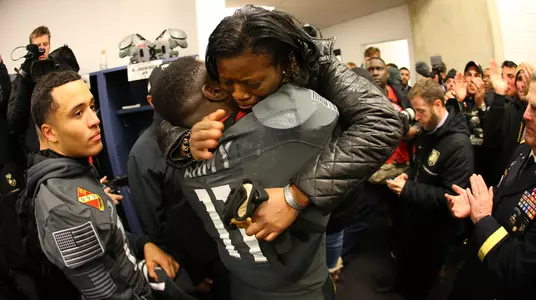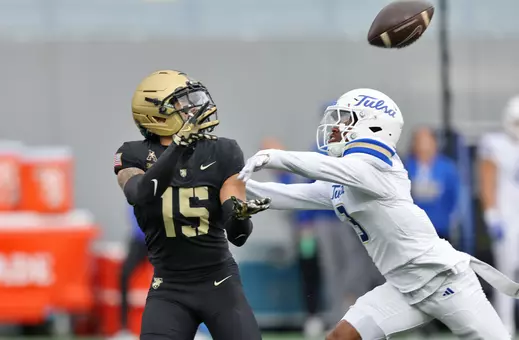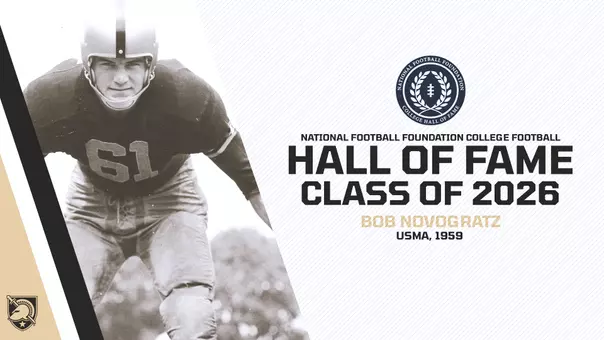Army West Point Athletics

Feinstein's Findings: This Win Was For Brandon
December 11, 2016 | Football
Twenty-one years ago, when I was researching "A Civil War," one of the many young men from both teams that I met and admired was a Navy senior named Mark Hammond.
Like the Army seniors of this year—and of the past 11 years—he went into his last Army-Navy game with one final chance to sing his alma mater second.
That was the year the Cadets drove 99-yards—converting a 4th-and-24 pass along the way—to beat the Mids, 14-13, for their fourth straight heart-stopping victory.
The next day, after returning to Annapolis, Hammond went to Hospital Hill—the Naval Academy cemetery. It had been exactly two years since Hammond's close friend, Robin Pegram had been killed along with two other Mids on a wet, rain-slicked road in an automobile accident en route home from the Army-Navy game. Periodically, Hammond would visit Pegram's grave, sit alone for a while and talk to her.
On that Sunday, a bright, cold day, Hammond sat down and said simply: "Well, they did it to us again."
Shortly before six o'clock on Saturday evening in Baltimore, Army's seniors had a sense of how Hammond had felt. They desperately wanted to win the 117th playing of the Army-Navy game to break the 14-game winning streak that felt as if it had lasted forever. And, they wanted to win in order to honor their fallen comrade, Brandon Jackson. Like Robin Pegram, Jackson had been killed in a car accident—early on the morning of September 11th, hours after a victory over Rice.
As the sun set and the temperature inside the stadium plummeted, Army saw what had been a 14-0 halftime lead turn into a 17-14 deficit early in the fourth quarter.
Army's defense had forced three Navy turnovers in the first half, but the Midshipmen, always cool under fire, had settled down in the second half. The Black Knights, having turned it over twice in the first half, fumbled twice more in the third quarter and suddenly there was Navy taking control of the game: touchdown, field goal, touchdown—the last on a brilliant 41-yard-run by quarterback Zach Abey—to take the lead, 17-14.
The old saying goes that adversity reveals character.
Army's players don't need to prove their character. You don't survive as a cadet without character. The academies quickly weed out those lacking in it.
The three words that shape a plebe more than any others? No excuse, sir.
They had already showed their character quite clearly when they traveled to Texas and destroyed UTEP 66-14 six days after Jackson died. They had come back from an embarrassing loss to North Texas (their opponent 16 days from now in the Heart of Dallas Bowl) to go on the road and come from behind to beat a good Wake Forest team.
Their character wasn't an issue when the offense took the field with a little more than 13 minutes left; 80 yards from the lead. But their ability to finally end The Streak and to honor Jackson with a victory, was very much in doubt.
In the stands, Morna Davis—Jackson's mother—watched. It was the first time she'd been able to bring herself to come to a game since her son's funeral—which had been attended by the entire Army team and coaches AND the entire NAVY coaching staff. When they talk about the mutual respect that makes Army-Navy so special, no hyperbole is needed.
Until that moment, Army quarterback Ahmad Bradshaw had thrown two passes. One had been an incomplete shovel pass. One had been intercepted. Now, needing something to get the offense jump-started, Bradshaw dropped back on first down and found Edgar Poe open just shy of midfield. Poe's entire name, of course, is Edgar Allen Poe. His nickname in high school was, 'The Raven.'
In his last Army-Navy game, playing in the city where the famous author lived, in the home stadium of a team called the Ravens, it was only right that Poe make arguably the most important play of the game.
From there, the Black Knights slowly picked their way downfield, churning out yards and eating up clock. This time, they wouldn't be stopped by a turnover. They wouldn't be stopped by the second key overrule of the game that went against them: a re-spot that turned a 1st-and-10 on the Navy 17 into a 4th-and-inches on the 18.
On that play, Bradshaw gave the ball to Andy Davidson, who had run well all day but fumbled twice. No hesitation. Davidson bulled for seven yards. Two plays later, Bradshaw was in the end zone and Army led 21-17.
But there were still six minutes left. Plenty of time for Navy to do it to Army again.
Not this time. Not this day. Not with so much at stake.
This time, the defense, which has been so good for almost the entire season—in spite of losing four cornerbacks, Jackson included—wouldn't let Navy picked up a first down. Faced with fourth-and-five from his own 40, Navy Coach Ken Niumatalolo didn't think he had a play to pick up the yardage against the swarming Army defense.
So, he punted. Navy never saw the ball again. The Mids only had one time-out left. They used it after Army had picked up a first down. Then, the Cadets picked up another first down and, on the sideline and in the stands realization set in: Navy couldn't stop the clock again. There was nothing to do but knee-down three times—perhaps say a prayer of thanks while doing so—and then celebrate.
Army has now won this game 50 times, but the argument can be made that none of the previous 49 brought quite the joy this one did. The Corps of Cadets stormed the field, creating a fairly frightening mosh pit before and after the playing of the alma maters.
The sight of them all standing at attention for the playing of, 'Blue-and-Gold,' was moving. The sight of them singing, 'Alma Mater,' a-cappella because almost the entire band was on the field, was wildly funny and also moving. The biggest challenge the players faced was getting through their celebrating classmates to get to the tunnel and the locker room.
Still coaching, Jeff Monken stood in the hallway outside the locker room and said, "I think we've still got guys out there," to assistant coach Mike Viti—one of those graduates who suffered through four straight losses to Navy.
He was right. Viti and a couple of others went back to the mayhem to rescue the players still out there. At that moment, Monken turned and saw Davis. He rushed to her, wrapped his arms around her and they both had a good cry.
Then, Davis accompanied Monken into the locker room. When everyone was finally inside and the doors closed, Monken didn't ask Superintendent LTG Robert Caslen to speak first. He didn't ask Army Chief-of-Staff Gen. Mark Milley to speak or Secretary of the Army Eric Fanning. He pushed Davis onto a chair and suddenly, the room was very quiet.
In a soft, tearful voice, Brandon Jackson's mom, a New York City police detective, thanked everyone in the room for remembering and honoring her son; for winning the game in his memory; for everything they had done for him and for her since that awful day three months ago.
They cheered her and then they listened to Monken, to Caslen, to Fanning, to Milley and to athletic director Boo Corrigan, who couldn't seem to get the tears out of his eyes in the aftermath of the victory.
And then, James Gibson, a classmate of Jackson's stood on the chair and presented Davis with a game-uniform honoring her son.
And finally—FINALLY--they sang 'The Song.'
It hadn't been heard inside an Army locker room after a Navy game in 15 years. "ON BRAVE OLD ARMY TEAM…" They sang with such force that down the hall in the Navy interview room, the words could be heard clearly as the Navy players and coaches talked quietly about the game. It is entirely possible that the words could be heard in Edgar Allan Poe's house in north Baltimore.
In truth, the words could be heard around the world.
Like the Army seniors of this year—and of the past 11 years—he went into his last Army-Navy game with one final chance to sing his alma mater second.
That was the year the Cadets drove 99-yards—converting a 4th-and-24 pass along the way—to beat the Mids, 14-13, for their fourth straight heart-stopping victory.
The next day, after returning to Annapolis, Hammond went to Hospital Hill—the Naval Academy cemetery. It had been exactly two years since Hammond's close friend, Robin Pegram had been killed along with two other Mids on a wet, rain-slicked road in an automobile accident en route home from the Army-Navy game. Periodically, Hammond would visit Pegram's grave, sit alone for a while and talk to her.
On that Sunday, a bright, cold day, Hammond sat down and said simply: "Well, they did it to us again."
Shortly before six o'clock on Saturday evening in Baltimore, Army's seniors had a sense of how Hammond had felt. They desperately wanted to win the 117th playing of the Army-Navy game to break the 14-game winning streak that felt as if it had lasted forever. And, they wanted to win in order to honor their fallen comrade, Brandon Jackson. Like Robin Pegram, Jackson had been killed in a car accident—early on the morning of September 11th, hours after a victory over Rice.
As the sun set and the temperature inside the stadium plummeted, Army saw what had been a 14-0 halftime lead turn into a 17-14 deficit early in the fourth quarter.
Army's defense had forced three Navy turnovers in the first half, but the Midshipmen, always cool under fire, had settled down in the second half. The Black Knights, having turned it over twice in the first half, fumbled twice more in the third quarter and suddenly there was Navy taking control of the game: touchdown, field goal, touchdown—the last on a brilliant 41-yard-run by quarterback Zach Abey—to take the lead, 17-14.
The old saying goes that adversity reveals character.
Army's players don't need to prove their character. You don't survive as a cadet without character. The academies quickly weed out those lacking in it.
The three words that shape a plebe more than any others? No excuse, sir.
They had already showed their character quite clearly when they traveled to Texas and destroyed UTEP 66-14 six days after Jackson died. They had come back from an embarrassing loss to North Texas (their opponent 16 days from now in the Heart of Dallas Bowl) to go on the road and come from behind to beat a good Wake Forest team.
Their character wasn't an issue when the offense took the field with a little more than 13 minutes left; 80 yards from the lead. But their ability to finally end The Streak and to honor Jackson with a victory, was very much in doubt.
In the stands, Morna Davis—Jackson's mother—watched. It was the first time she'd been able to bring herself to come to a game since her son's funeral—which had been attended by the entire Army team and coaches AND the entire NAVY coaching staff. When they talk about the mutual respect that makes Army-Navy so special, no hyperbole is needed.
Until that moment, Army quarterback Ahmad Bradshaw had thrown two passes. One had been an incomplete shovel pass. One had been intercepted. Now, needing something to get the offense jump-started, Bradshaw dropped back on first down and found Edgar Poe open just shy of midfield. Poe's entire name, of course, is Edgar Allen Poe. His nickname in high school was, 'The Raven.'
In his last Army-Navy game, playing in the city where the famous author lived, in the home stadium of a team called the Ravens, it was only right that Poe make arguably the most important play of the game.
From there, the Black Knights slowly picked their way downfield, churning out yards and eating up clock. This time, they wouldn't be stopped by a turnover. They wouldn't be stopped by the second key overrule of the game that went against them: a re-spot that turned a 1st-and-10 on the Navy 17 into a 4th-and-inches on the 18.
On that play, Bradshaw gave the ball to Andy Davidson, who had run well all day but fumbled twice. No hesitation. Davidson bulled for seven yards. Two plays later, Bradshaw was in the end zone and Army led 21-17.
But there were still six minutes left. Plenty of time for Navy to do it to Army again.
Not this time. Not this day. Not with so much at stake.
This time, the defense, which has been so good for almost the entire season—in spite of losing four cornerbacks, Jackson included—wouldn't let Navy picked up a first down. Faced with fourth-and-five from his own 40, Navy Coach Ken Niumatalolo didn't think he had a play to pick up the yardage against the swarming Army defense.
So, he punted. Navy never saw the ball again. The Mids only had one time-out left. They used it after Army had picked up a first down. Then, the Cadets picked up another first down and, on the sideline and in the stands realization set in: Navy couldn't stop the clock again. There was nothing to do but knee-down three times—perhaps say a prayer of thanks while doing so—and then celebrate.
Army has now won this game 50 times, but the argument can be made that none of the previous 49 brought quite the joy this one did. The Corps of Cadets stormed the field, creating a fairly frightening mosh pit before and after the playing of the alma maters.
The sight of them all standing at attention for the playing of, 'Blue-and-Gold,' was moving. The sight of them singing, 'Alma Mater,' a-cappella because almost the entire band was on the field, was wildly funny and also moving. The biggest challenge the players faced was getting through their celebrating classmates to get to the tunnel and the locker room.
Still coaching, Jeff Monken stood in the hallway outside the locker room and said, "I think we've still got guys out there," to assistant coach Mike Viti—one of those graduates who suffered through four straight losses to Navy.
He was right. Viti and a couple of others went back to the mayhem to rescue the players still out there. At that moment, Monken turned and saw Davis. He rushed to her, wrapped his arms around her and they both had a good cry.
Then, Davis accompanied Monken into the locker room. When everyone was finally inside and the doors closed, Monken didn't ask Superintendent LTG Robert Caslen to speak first. He didn't ask Army Chief-of-Staff Gen. Mark Milley to speak or Secretary of the Army Eric Fanning. He pushed Davis onto a chair and suddenly, the room was very quiet.
In a soft, tearful voice, Brandon Jackson's mom, a New York City police detective, thanked everyone in the room for remembering and honoring her son; for winning the game in his memory; for everything they had done for him and for her since that awful day three months ago.
They cheered her and then they listened to Monken, to Caslen, to Fanning, to Milley and to athletic director Boo Corrigan, who couldn't seem to get the tears out of his eyes in the aftermath of the victory.
And then, James Gibson, a classmate of Jackson's stood on the chair and presented Davis with a game-uniform honoring her son.
And finally—FINALLY--they sang 'The Song.'
It hadn't been heard inside an Army locker room after a Navy game in 15 years. "ON BRAVE OLD ARMY TEAM…" They sang with such force that down the hall in the Navy interview room, the words could be heard clearly as the Navy players and coaches talked quietly about the game. It is entirely possible that the words could be heard in Edgar Allan Poe's house in north Baltimore.
In truth, the words could be heard around the world.
Players Mentioned
Army vs. Bucknell Women's Basketball Game Highlights
Thursday, January 22
2026 West Point Open (Army Spotlight)
Saturday, January 17
Army Women's Basketball Ericson Feature
Friday, January 02
Wasabi Fenway Bowl Game Highlights
Saturday, December 27








